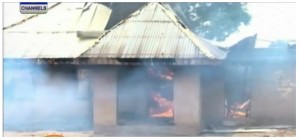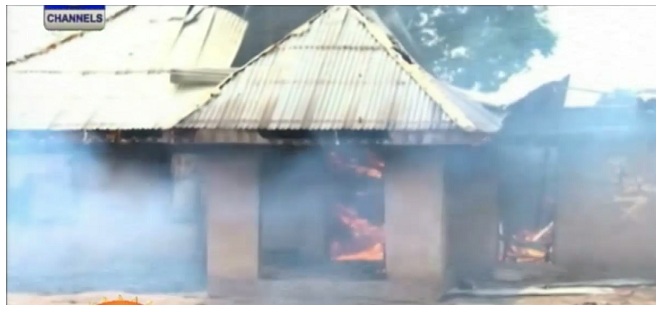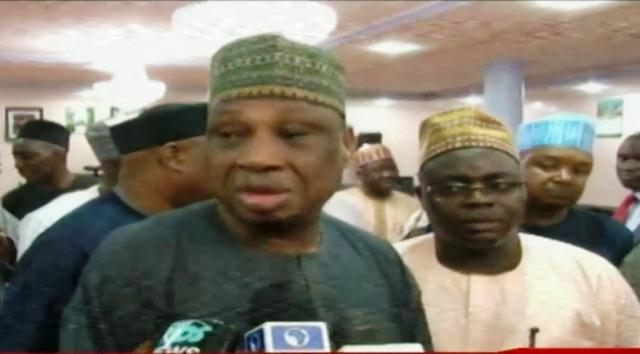
In some attacks there was an alleged use of chemical substances that left people that inhaled it dead with foams coming out from their mouths, a development that caught the attention of Nigerian lawmakers.
The governors of the two states had promised to restore order in the affected communities
Also worried are members of the House of Representatives after a motion, describing the crisis as a matter of urgent national importance, was brought to the floor of the house for consideration.
Although a peace deal facilitated by the Nigerian police has been reached between both parties, the house would be interested in knowing how the chemical substances can be tracked before it spreads to other parts of the country
Constitution Amendment
In the Senate, it was a week that saw federal lawmakers in the Senate bring up fresh proposals to amend the electoral act and the Nigerian Constitution.
The new proposals were in continuation of the amendment of the constitution which the National Assembly began almost two years ago.
Some of the bills had to do with the amendment of the Electoral Act.
Senator Abu Ibrahim sponsored one of the bills which sought to amend the electoral act to provide for elections to be held on the same day.
But majority of the lawmakers rejected this amendment.
Another bill, which was sponsored by the Deputy Senate President, Senator, Ike Ekweremadu, seeks to amend the Electoral Act to provide for the tenure of the office of the secretary of Independent National Electoral Commission (INEC) and determine voting procedure.
According to the Deputy Senate President, the bill seeks to grant INEC the latitude to use electronic voting system when it has the capacity to do so.
Another lawmaker is sponsoring a bill to amend the 2010 Electoral Act to put the burden of proving the regularity of any election on the INEC. The bill has passed second reading in the Senate.
If eventually passed, the electoral body would be charged with the responsibility of proving the regularity of an election before the election tribunal or court in Nigeria.
The sponsor of the bill, Senator Hadi Sirika, in his debate said the responsibility of proving the regularity of an election ought to be the duty of the body or organisation that arranged for the conduct of the election and thereafter conducted the said election
But another lawmaker, Senator Heineken Lopobiri, disagreed saying the bill is “at variance with the laws of the country”.
But when the question was put forward, majority of lawmakers supported the amendment and the bill passed second reading.
That was not all on amendment of the constitution and Electoral Act.
Producing A New Constitution
The senate committee which has been working on reviewing the constitution presented some new proposals at the April 2 plenary.
One of the proposals is to make provision for the president in addition to the National Assembly to initiate a process of producing a new constitution.
For years, some Nigerians have said the 1999 c onstitution does not represent the wishes and aspirations of the people, as it had more of military input.
Even with a constitutional review underway in the National Assembly, the voices calling for a new constitution have not quietened.
This is creating a window of opportunity for Nigerians to have a new constitution, with the chances that a new constitution might come as a recommendation of the National Conference currently holding in Abuja, Nigeria’s capital.
A matter of such significance elicited an intense debate for and against the proposal.
Other new proposals which were presented for amendment include alterations of section 68 and 109 to mandate the clerk of the National Assembly and State House of Assembly to notify INEC in writing, within seven days, of the vacancy arising from the death, resignation or vacation of seat of a member of the National or State Assembly.
Another proposal is to empower INEC to deregister political parties which fail to win presidential, governorship, chairmanship of a local government, area council or seat in the National or State Assembly.
Lawmakers would vote on these amendments on Wednesday April 9.
Lawmakers React To Judgement On Defecting Members
In the House of Representatives, the court judgment delivered over the matter of defection of some members of the house from the ruling Peoples Democratic Party, (PDP) to the All progressives Congress (APC) generated a lot of reactions.
The APC caucus in the house spoke to journalist about the judgement.
“None of their 37 members that defected from the ruling party shall vacate their seats nor cease to take part in major decisions in the House as partly ruled in the judgment by a Federal High Court in Abuja,” they said.
Minority Whip of the house, Samson Osagie, told journalists that Justice Adeniyi Ademola, who delivered the judgement, was merely expressing an opinion over a matter that was not before him and in effect meddling with the internal affairs of the house on which he is ignorant.
He however said the defected lawmakers had appealed the judgment.
The House of Representatives also took a stand on the matter after it arose from an executive session.
The deputy chairman of the House Committee on Media, Representative Victor Ogene, said the decision of the house was that no action should be taken on the matter until all cases in court over the defection had been concluded.
Representative Ogene said the lawmakers are not in a hurry to act and the speaker of the house was not under any pressure to declare the seats of any of its members vacant.


